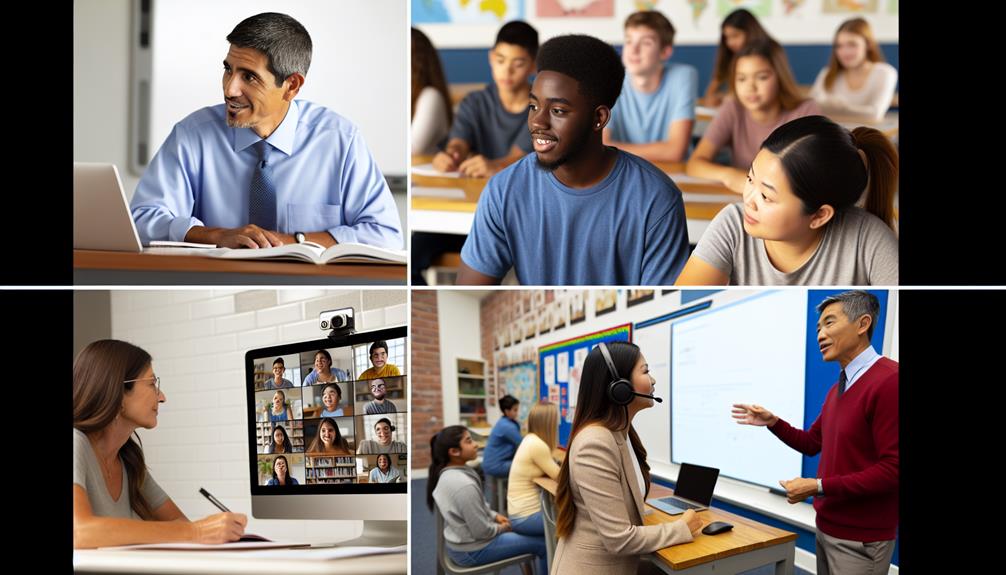To apply for a teaching license in the USA, start by earning your bachelor's degree from an accredited institution. Then, complete an approved educator preparation program that includes student teaching. Next, pass state-required certification exams, which may cover basic skills and subject knowledge. After that, submit your application to the state education agency, along with necessary documents and fees. Each state has its own guidelines, so make sure to research those specifics. By following these steps, you'll be on your way to becoming a licensed educator and discovering other important aspects of the process.
Key Takeaways
- Earn a bachelor's degree from an accredited institution as a foundational qualification for teaching licensure.
- Complete a state-approved educator preparation program, including coursework and student teaching experience.
- Pass required certification exams, such as basic skills and subject knowledge assessments, specific to your state.
- Submit a license application through your state education agency, including necessary documentation and fees.
- Understand and comply with state-specific licensing requirements, including background checks and portfolio submissions.
Overview of Teaching Licenses
When you consider becoming a teacher, understanding the concept of a teaching license is essential. A teaching license, also known as a teaching certificate or credential, is an official authorization from your state education agency that validates your competence in specific subject areas. To obtain this license, you'll typically need to complete a bachelor's degree, an approved educator preparation program, and pass required exams, like the Praxis.
Each state has its own teacher certification requirements, which might include background checks and portfolio submissions. This means you should familiarize yourself with the specific standards in your state. Generally, a teaching license is required for public school teachers, and many private schools also prefer or require it. The credentials you acquire are often tailored to the grade levels and subject areas you wish to teach.
If you ever consider moving to another state, it's good to know that reciprocity agreements exist between over 40 states. These agreements make it easier for teachers with a valid license from one state to obtain certification in another state, simplifying the process for you as you advance in your teaching career.
Steps to Obtain a License
To obtain a teaching license, you'll need to follow several key steps that confirm you're fully prepared for the classroom. First, earn a bachelor's degree from an accredited institution, as this is a foundational qualification for teaching licensure in most states. Next, complete a state-approved educator preparation program, which will include coursework and essential student teaching experience to guarantee you're ready for real classroom challenges.
After that, you'll need to pass any required certification exams, such as basic skills tests or subject knowledge assessments, which can vary by state and may include the Praxis exams. Once you've successfully completed these steps, you'll submit an application for your teaching license through your state education agency. Make sure to include all required documentation and fees to avoid delays in processing.
Types of Teaching Programs

After you've navigated the steps to obtain your teaching license, it's important to contemplate the various types of teaching programs available. You can choose from traditional undergraduate programs, where you earn both a degree and a teaching certificate simultaneously. If you already hold a bachelor's degree, consider an alternative certification program designed for your shift into teaching.
Residency programs offer on-the-job training and paid positions, allowing you to gain practical experience while completing certification requirements. If you possess a degree in a non-education field and want to change careers, certificate-only programs provide a streamlined path without the need for a full master's degree.
For those seeking advanced qualifications, master's degree programs are available, often requiring prior teaching experience or an education degree. Finally, accelerated programs cater to mid-career professionals, offering intensive coursework and flexible scheduling to facilitate a quicker shift into teaching. Each option has its unique advantages, so evaluate your background, goals, and timeline to determine which teaching program aligns with your aspirations and leads to obtaining your teaching certificates.
Required Testing for Certification
Obtaining your teaching license often hinges on passing several required tests that assess your readiness for the classroom. Most states require you to take basic skills tests that evaluate your competencies in reading, writing, and math. These foundational skills are essential for effective teaching. Additionally, subject knowledge tests gauge your proficiency in the specific subjects you'll teach. Many states use Praxis exams, while others have their own unique assessments.
To help you prepare for these required examinations, many teacher certification programs offer assistance. This support can be invaluable in ensuring you meet the certification requirements. In some cases, you may also need to create a teaching portfolio that showcases your teaching methods and materials, further demonstrating your readiness for the role.
Alternative Certification Pathways

Alternative certification pathways offer a practical solution for individuals with a bachelor's degree looking to enter the teaching profession without going through a traditional education program. These pathways allow you to fast-track your teaching career by obtaining your certification through various methods tailored to your unique situation.
Many states provide residency programs where you can work as a paid teacher while completing your certification. This hands-on experience is invaluable as it helps you gain practical experience in the classroom. If you're a mid-career professional, you might consider accelerated certification programs, which can help you earn your credentials in as little as one year.
Hybrid coursework formats are another attractive option, allowing you to balance your current job while pursuing your teaching credentials. It's crucial to consult with program staff to guarantee you understand state-specific requirements and the available alternative certification pathways. By doing so, you'll be well-equipped to shift into the role of a certified teacher and make a meaningful impact in the classroom. Embracing these alternative certification options can be your gateway to a fulfilling teaching career.
Resources for Teacher Candidates
What resources can help you navigate the complex journey of becoming a certified teacher? You'll find a wealth of information available to guide you through the certification process, ensuring you meet all specific requirements for your state. Here are some valuable resources:
- TEACH.org: This website offers extensive guides on certification processes, program selections, and state-specific requirements, helping you understand the necessary steps to earn your degree.
- University Mentorship Programs: Many universities connect you with experienced educators, providing support and advice throughout your journey toward a teaching job.
- Online Webinars and Workshops: Platforms host sessions covering exam preparation and application guidance, making it easier for you to navigate the required coursework and testing resources.
- Scholarship Opportunities: Look for financial assistance through educational institutions and organizations focused on supporting future educators, especially if you're concerned about the costs involved in meeting criminal background checks and other requirements.
Benefits of Certification

Securing a teaching license offers numerous advantages that can greatly impact your career. One of the primary benefits is enhanced employability. A valid certification validates your competencies, allowing you to teach in public and many private schools across the country. This means more job opportunities and a higher likelihood of earning a position that matches your degree.
Additionally, being a certified teacher provides professional recognition, establishing your credibility among peers and fostering trust with students and parents. This recognition can lead to stronger relationships within the educational community.
Moreover, licensed educators often enjoy better job security and access to higher salary scales compared to non-certified teachers. This financial advantage makes certification a smart career choice.
Having a teaching license is also essential for pursuing leadership roles within educational institutions. It equips you with the necessary pedagogical knowledge and skills required for advancement.
Lastly, certified teachers must engage in continuous professional development, ensuring that you stay updated on best practices and educational innovations. This commitment to growth not only enhances your teaching effectiveness but also keeps your career vibrant and fulfilling.
Frequently Asked Questions
How to Obtain a Teaching License in the Usa?
To obtain a teaching license in the USA, you'll need to start by earning a bachelor's degree from an accredited institution, which usually takes 4-5 years. After that, complete a state-approved Educator Preparation Program, and pass the necessary certification exams. Once you've met these educational and testing requirements, submit your application to your state's education agency, along with any fees and documentation needed, and undergo a national criminal background check.
Can a Foreigner Get a US Teaching License?
Yes, you can get a U.S. teaching license as a foreigner if you meet specific state requirements. Most states require a bachelor's degree and completion of an accredited teacher preparation program. Some offer alternative certification options, speeding up the process for degree holders. Additionally, reciprocity agreements may let you teach with your existing credentials. It's important to research the licensing regulations in the state where you want to teach to guarantee you meet all requirements.
How Do You Qualify as a Teacher in the Us?
To qualify as a teacher in the U.S., you need to hold a bachelor's degree from an accredited institution. You'll also have to complete a state-approved educator preparation program, which could be traditional or alternative. Passing state certification exams is essential to demonstrate your subject knowledge. Additionally, you'll undergo a background check, including fingerprinting. Finally, you must submit an application for certification through your state's education agency, along with the required documentation.
What Is the Fastest Teaching Certificate?
If you're looking for the fastest teaching certificate, consider alternative certification programs. They often let you complete your certification in a year or less if you already have a bachelor's degree. Residency programs combine paid teaching positions with coursework, giving you practical experience while you earn your credentials. You might also explore expedited options if you're a career changer, or certificate-only programs if you've already earned a degree.
